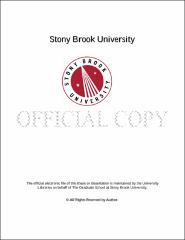| dc.identifier.uri | http://hdl.handle.net/11401/77057 | |
| dc.description.sponsorship | This work is sponsored by the Stony Brook University Graduate School in compliance with the requirements for completion of degree. | en_US |
| dc.format | Monograph | |
| dc.format.medium | Electronic Resource | en_US |
| dc.language.iso | en_US | |
| dc.publisher | The Graduate School, Stony Brook University: Stony Brook, NY. | |
| dc.type | Thesis | |
| dcterms.abstract | Cancer remains the second leading cause of death in the United States. Although tremendous efforts have been made in the area of cancer therapy, there is still no common cure for cancer. Paclitaxel, which is a microtubule stabilizer, is used as an antitumor agent against several cancers such as ovarian, lung, and breast cancer. However, paclitaxel shows poor antitumor activities against drug resistant cell lines, and may cause undesirable side effects. Over the past decades, significant achievements have been made in the development of new generation taxoids that exhibit increased cytotoxicity against resistant cancer cell lines. Additionally work has been done towards the development of tumor-targeting drug delivery systems (TTDDS) to selectively distinguish cancer cells from normal cells. Based on structure-activity relationship (SAR) studies on taxanes, second generation taxoid SB-T-1214 and third generation taxoids SB-T-121202, SB-T-121302, SB-T-121402, SB-T-121602, and SB-T-121702 were synthesized via the Ojima-Holton coupling reaction. The biological evaluation of these novel taxoids showed excellent IC50 values against certain drug sensitive and drug resistant cancer cell lines by MTT assays. Biotin receptors are overexpressed on the surface of some cancer cell lines to maintain rapid cancer cell growth. Dendrimers are well-defined three-dimensional macromolecules, which can be used to increase the payload of the drugs, targeting efficacy of the conjugate, and other biological and physiological properties. Based on this fact, two dendrimer-based multifunctional conjugates for tumor-targeting drug delivery were synthesized by employing biotin as targeting moiety and second generation taxoid SB-T-1214 as antitumor agent. | |
| dcterms.available | 2017-09-20T16:51:48Z | |
| dcterms.contributor | Drueckhammer, Dale | en_US |
| dcterms.contributor | Ojima, Iwao | en_US |
| dcterms.contributor | Ngai, Ming-Yu. | en_US |
| dcterms.creator | Sun, Yi | |
| dcterms.dateAccepted | 2017-09-20T16:51:48Z | |
| dcterms.dateSubmitted | 2017-09-20T16:51:48Z | |
| dcterms.description | Department of Chemistry | en_US |
| dcterms.extent | 174 pg. | en_US |
| dcterms.format | Monograph | |
| dcterms.format | Application/PDF | en_US |
| dcterms.identifier | http://hdl.handle.net/11401/77057 | |
| dcterms.issued | 2016-12-01 | |
| dcterms.language | en_US | |
| dcterms.provenance | Made available in DSpace on 2017-09-20T16:51:48Z (GMT). No. of bitstreams: 1
Sun_grad.sunysb_0771M_12762.pdf: 18884388 bytes, checksum: 2892ad12a137a980dd259cfe8420b381 (MD5)
Previous issue date: 1 | en |
| dcterms.publisher | The Graduate School, Stony Brook University: Stony Brook, NY. | |
| dcterms.subject | Chemistry -- Organic chemistry | |
| dcterms.title | Synthesis of New Generation Taxoid Anticancer Agents and Dendrimer-Based Multifunctional Conjugates for Tumor-Targeting Drug Delivery | |
| dcterms.type | Thesis | |

